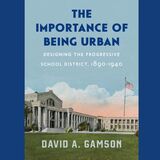103 books about Conversations and 5
start with R
103 books about Conversations and 5
103 books about Conversations
5 start with R start with R
5 start with R start with R
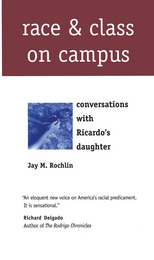
Race and Class on Campus
Conversations with Ricardo’s Daughter
Jay M. Rochlin
University of Arizona Press, 1997
Racism. Is it alive and well and living on college campuses across the United States? Is it a factor in high dropout rates and other crises affecting minority college students, and if so, how? Are controversial programs of affirmative action proving to be a solution--or are they part of the problem?
Here are some insights into the hot issues sparking debate over equal opportunity and American education. In these pages, through the use of a fictional character, author Jay Rochlin presents more than forty very real African American and Mexican American men and women who struggled to earn degrees at a large, nationally recognized university in the west. Their goals, their gains, and their disappointments echo the experiences of millions of others around the country during much of the twentieth century. Perhaps most important, their true stories will provide inspiration to the many young people who wonder whether pursuing the dream of a college education is possible for them.
Readers will warm to the words of Carlos Vélez-Ibáñez, learning as a toddler from his father that the university represented toda la sabiduría del mundo,"all the wisdom in the world." Their hearts will go out to young Laura Banks, barred as a black woman from a "whites only" pool and the swimming class required for her degree in physical education. In the face of open hostility and closed doors, these students and many others persevered. When they were shunned by Anglo social clubs, they created their own. When they were assigned "back of the room" seating because of discrimination, they rose above it. And when their ultimate goal--graduation--was threatened by racism, they fought it.
Looking back, many in the book remember coming from poor families who nonetheless considered themselves middle class and, as such, simply expected their children to go to college. This family support--bolstered by the students' own drive, ambition, and sense of responsibility--seemed to be pivotal to their success. Thus the book comes out strongly on the side of critical race theorists, who emphasize individual effort as a means of combating racism and personal narratives as a way of analyzing the complex issue.
These pages are filled with the voices of everyday men and women. Their language is straightforward and from the heart. Their message is timely, in the midst of current debates over race, class, and affirmative action. And their words--for American education and for the country as a whole--carry force and meaning guaranteed to reach far into the future.
Here are some insights into the hot issues sparking debate over equal opportunity and American education. In these pages, through the use of a fictional character, author Jay Rochlin presents more than forty very real African American and Mexican American men and women who struggled to earn degrees at a large, nationally recognized university in the west. Their goals, their gains, and their disappointments echo the experiences of millions of others around the country during much of the twentieth century. Perhaps most important, their true stories will provide inspiration to the many young people who wonder whether pursuing the dream of a college education is possible for them.
Readers will warm to the words of Carlos Vélez-Ibáñez, learning as a toddler from his father that the university represented toda la sabiduría del mundo,"all the wisdom in the world." Their hearts will go out to young Laura Banks, barred as a black woman from a "whites only" pool and the swimming class required for her degree in physical education. In the face of open hostility and closed doors, these students and many others persevered. When they were shunned by Anglo social clubs, they created their own. When they were assigned "back of the room" seating because of discrimination, they rose above it. And when their ultimate goal--graduation--was threatened by racism, they fought it.
Looking back, many in the book remember coming from poor families who nonetheless considered themselves middle class and, as such, simply expected their children to go to college. This family support--bolstered by the students' own drive, ambition, and sense of responsibility--seemed to be pivotal to their success. Thus the book comes out strongly on the side of critical race theorists, who emphasize individual effort as a means of combating racism and personal narratives as a way of analyzing the complex issue.
These pages are filled with the voices of everyday men and women. Their language is straightforward and from the heart. Their message is timely, in the midst of current debates over race, class, and affirmative action. And their words--for American education and for the country as a whole--carry force and meaning guaranteed to reach far into the future.
[more]
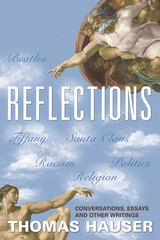
Reflections
Conversations, Essays, and Other Writings
Thomas Hauser
University of Arkansas Press, 2014
Thomas Hauser is well known to readers as Muhammad Ali's biographer and for his recording of the contemporary boxing scene. But Hauser began his writing career in the political arena as the author of Missing, a novel later made into an AcademyAward-winning film starring Jack Lemmon and Sissy Spacek. He has written books on subjects as diverse as public education, moral values, and Chernobyl, and his articles have appeared in publications ranging from the New Yorker to Penthouse. Reflections brings together all of Hauser's articles on subjects other than sports. The book begins with a never-published essay on the Beatles. It then takes readers on a remarkable journey that moves from an exploration of racism, religion, and other hot-button political issues to personal memories and reflections on the origins of Santa Claus and the Tiffany box. Combining personal memories with issue-oriented commentary, Reflections creates a portrait of some of the most remarkable people and most compelling issues of our time.
[more]
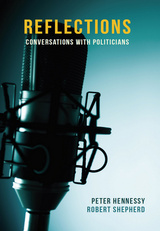
Reflections
Conversations with Politicians
Peter Hennessy and Robert Shepherd
Haus Publishing, 2016
“The historian,” wrote E. L. Doctorow, “will tell you what happened. The novelist will tell you what it felt like.” This book sees Peter Hennessy and Robert Shepard combine both approaches with the art of the interviewer, a craft at once sensitive and probing.
Reflections collects transcripts of the best interviews from the BBC Radio 4 series Reflections with Peter Hennessy, a show on which the British political elite have spoken candidly about their careers and the moments that came to define their political lives. Supplementing the interviews are short biographies and profiles of the interviewees, allowing readers a fuller picture of each speaker’s background and professional trajectory. This revealing book includes conversations with political heavyweights such as former prime minister John Major; former foreign secretaries Margaret Beckett, David Owen, and Jack Straw; Labour Party leader Neil Kinnock; Liberal Party leader David Steel; and chancellor of exchequer Nigel Lawson. In addition, Reflections presents interviews with leading women, including Shirley Williams and Clare Short, who spent years at the forefront of their parties in Westminster.
The latest volume in the popular Haus Curiosities series, Reflections offers valuable insights from some of today’s most influential political figures.
Reflections collects transcripts of the best interviews from the BBC Radio 4 series Reflections with Peter Hennessy, a show on which the British political elite have spoken candidly about their careers and the moments that came to define their political lives. Supplementing the interviews are short biographies and profiles of the interviewees, allowing readers a fuller picture of each speaker’s background and professional trajectory. This revealing book includes conversations with political heavyweights such as former prime minister John Major; former foreign secretaries Margaret Beckett, David Owen, and Jack Straw; Labour Party leader Neil Kinnock; Liberal Party leader David Steel; and chancellor of exchequer Nigel Lawson. In addition, Reflections presents interviews with leading women, including Shirley Williams and Clare Short, who spent years at the forefront of their parties in Westminster.
The latest volume in the popular Haus Curiosities series, Reflections offers valuable insights from some of today’s most influential political figures.
[more]
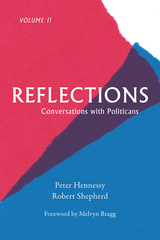
Reflections
Conversations with Politicians Volume II
Peter Hennessy and Robert Shepherd
Haus Publishing, 2019
Accompanying the acclaimed BBC Radio 4 program, Reflections features interviews with twelve of Britain’s most influential political figures from the last twenty years. Presented by Peter Hennessy, one of the UK’s most renowned historians, each interview not only offers an honest and frank assessment of a political career, but also acts as a biography filled with fresh insights and moments of new revelation. From one of the longest-serving Prime Ministers and three of the Conservative leaders who stood against him, to dominant figures of late Thatcherism, stalwarts of successive New Labour cabinets, and leaders of the Liberal Democrats, Hennessy brings his characteristic style to each encounter. The politicians included in this volume are: Tony Blair, Michael Heseltine, Vince Cable, Margaret Hodge, William Hague, Harriet Harman, Michael Howard, Paddy Ashdown, Sayeeda Warsi, David Blunkett, Iain Duncan Smith and Kenneth Baker.
[more]
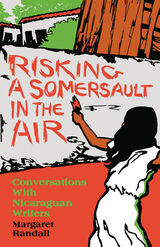
Risking a Somersault in the Air
Conversations with Nicaraguan Writers
Margaret Randall
Northwestern University Press, 1995
On July 19, 1979 the Nicaraguan people, under the banner of the Sandinista National Liberation Front, overthrew the 40-year-long Somoza family tyranny. Amongst those playing major roles in this popular revolution were many of the nation's leading poets and writers. Today, these men and women are focusing their creativity on the tasks of constructing a new nation and a new Nicaraguan culture. Through these interviews with 14 of Nicaragua's most important writers/revolutionaries we come to learn that Nicaragua's revolution, like its poetry, is an expression of great love, imagination and liberation.
[more]
READERS
Browse our collection.
PUBLISHERS
See BiblioVault's publisher services.
STUDENT SERVICES
Files for college accessibility offices.
UChicago Accessibility Resources
home | accessibility | search | about | contact us
BiblioVault ® 2001 - 2025
The University of Chicago Press






